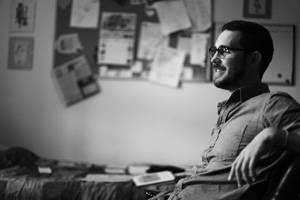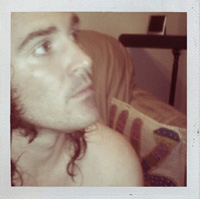James Joyce and B.C. Ferries: stephen leckie in Conversation with Matt Rader

Malahat volunteer stephen leckie talks with Issue #184 contributor Matt Rader on his fiction story entitled, "All This Was a Long Time Ago."
So, how much fun did you have with Joyce on B.C. Ferries?
He's an inscrutable sort. Difficult. He knew all my best lines and everything I was going to say next.
What is the allure toward writing about a dead author?
At some point, when I was younger, I realized it was crazy to live on the West Coast and not write about trees. I was born and raised on Vancouver Island and the place is literally covered in trees. Same with the sea. These are major presences in my life. Likewise, after nearly twenty years of reading and writing seriously, writers and literature have become unavoidable subjects. That Joyce is dead is a stroke of luck. Mary Ruefle has said a living poet can't teach you anything but a dead poet can teach you everything.
Your narrator’s decision “to leave [his] wife of fifteen years” is expressed in a dissonance between what the reader learns and what is actually said. How did you connect the scenes at the café in Pola and the gathering at the narrator's home?
I wrote the Joyce story for a while before the contemporary story emerged, even though I had originally been inspired by a contemporary moment. I think the key thing in the two scenes you mention are the grapes and the narrator's discomfort with his wife and friends and how they are eating and drinking. It casts the narrator not as a parallel for Joyce, but for Eyers. The grapes are also part of chain of synecdochal imagery that includes the wine that the trio is drinking in Cafe Miramar.
There are certain details within the story that capture the history of Joyce’s life and his connection to the people he knew. When Joyce leaves the table, the reader and narrator go with him. What sorts of details are better “lost to history”?
I don’t know that I can make any categorical statement about that. Much is lost to history and I suspect it has no meaning except for what we attempt to give it. In this story, the “lost to history” comment is as much a technique as a statement. It’s an attempt to elide an aspect that I didn’t feel was important for my imagination to pursue. Or that I wasn’t capable of pursuing. Whatever the story. It’s a ploy made possible by the mixing of historical and imaginative fact.
Did you find that "The Dead" was a passage into a particular tone for "All This Was a Long Time Ago"?
The real model for this story was Raymond Carver's story "Errand" about the last days of Anton Chekhov. It's an oddity in the Carver oeuvre. Carver, like Joyce in "The Dead," tended to draw on characters and situations that echoed or rhymed with parts of his own life. Though it is a later Carver story, and who knows if Carver saw himself in Chekhov or not at that point. Maybe we're always writing about ourselves. Whoever we are.
As it happens, I'm not really a Joyce fan. I love "The Dead." I love "Araby." But I've never read the novels. I don't know how Joyce came into my life except that I had an experience on a B.C. Ferry in which the faces in the window reminded me of the passage in the Odyssey when Odysseus communes with the dead. And thinking of that reminded me of Gabriel and then somehow Carver's model and Joyce fit together in my imagination and I was writing.
In a way I think I take a step closer to myself in "All This Was a Long Time Ago" than Carver does in "Errand." But I'm not Raymond Carver or James Joyce and I'm reluctant to say much more for fear of comparing myself.
I did get a chance earlier this year to stand on the corner where Joyce reportedly met Nora in Dublin. I also went to Galway and saw the small home where Nora grew up and Michael Bodkin may or may not have thrown pebbles at her window.
There is definitely a distance between Carver and Chekhov in "Errand." Did Chekhov's attitude in the face of his TB instil a way of seeing the autobiographical elements of your story?
Chekhov is generally an exemplary character. I don't know if his attitude towards his health influenced me―his whole persona influenced and continues to influence me. Which is hardly unique among writers, especially writers of stories.
Talking about Chekhov's attitude towards his death brings up all the questions around truth and fiction, history and invention that both Carver's story and mine play with. Carver's story looms large in my imagination when I think of the late Chekhov. When I first read "Errand," I recognized a lot from the beginning that came right out of Chekhov's letters. I used a similar ploy with Joyce.
But really, reading Carver, I didn't know where the history left off and the pure invention began.
I read a memoir once about one writer's pilgrimage to Russia in search of places of historical connection to Chekhov and his work. She wrote about the many accounts of Chekhov's death and concluded that several details now commonly cited in contemporary accounts actually emerged in Carver's story. She scolded Carver for this, bemoaning what she perceived as a lack of imagination on his part that lead him to corrupt the historical record. This confirmed for me the genius of his strategy.
For Odysseus, there is nothing finer than homecoming, yet it struck me that your narrator’s return has some of the colouring of an underworld experience. Is it possible for the traveller to remain lost as they reach home?
One of my favourite poets, Michael Longley, was once described as "an Odysseus for whom every landfall is a homecoming." The critic was not actually talking about Longley but about the persona of the poet in his poems―a way of finding home even as travels. It’s true that Odysseus wanted to get home, but it’s worth remembering that the end of the story he’s travelling again. Sometimes you have to go away to get home. Ask Joyce.
My traveller is not home. He’s in a liminal state out on the water where he can’t even tell if the boat is moving. That can happen to you anywhere.
How do you compare your own poetic process with the work of short story writing? Is there any aspect of the two that bleed into one another?
My processes in both stories and poems has changed so much over the years that it's difficult to make any specific claims about them. I tend to do something that I would describe as collecting. This process goes on for as long as it needs to and is coupled with a process I'd called waiting. In both the poem and the story I wait for a moment when whatever it is that really needs to be put down in words must be put down. I try to wait until the last possible moment. Andre Dubus talked about letting the story come into his body but not fully―he wanted to begin writing just before the story entered him fully. It's two processes really. One is working. One is waiting. And when then they touch or rhyme with each other, I begin to write. And the same process continues all through the writing. And after.

stephen leckie
* * * * * * * *









